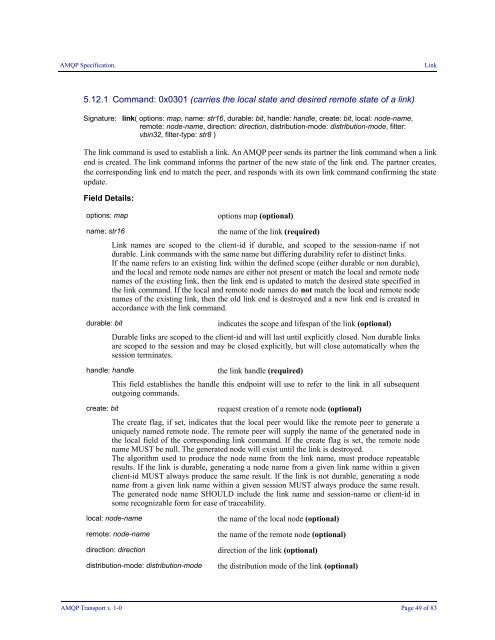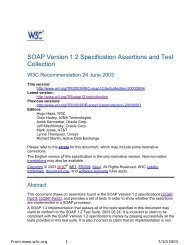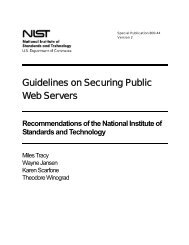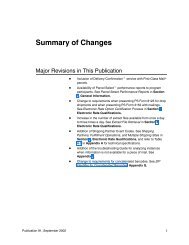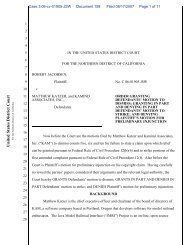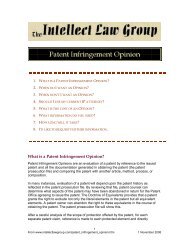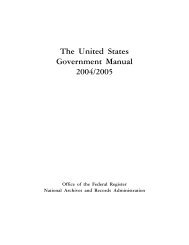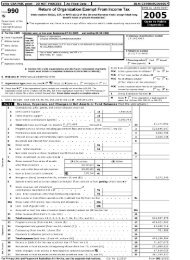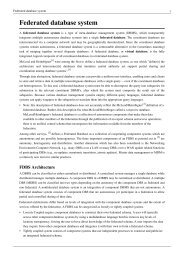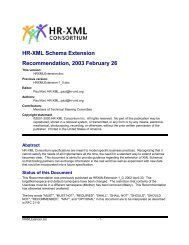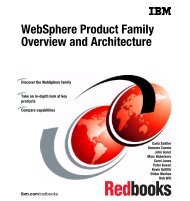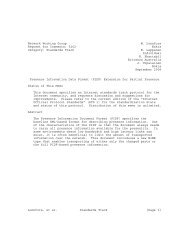AMQP Specification Transport
AMQP Specification Transport
AMQP Specification Transport
Create successful ePaper yourself
Turn your PDF publications into a flip-book with our unique Google optimized e-Paper software.
<strong>AMQP</strong> <strong>Specification</strong>.<br />
Link<br />
5.12.1 Command: 0x0301 (carries the local state and desired remote state of a link)<br />
Signature:<br />
link( options: map, name: str16, durable: bit, handle: handle, create: bit, local: node-name,<br />
remote: node-name, direction: direction, distribution-mode: distribution-mode, filter:<br />
vbin32, filter-type: str8 )<br />
The link command is used to establish a link. An <strong>AMQP</strong> peer sends its partner the link command when a link<br />
end is created. The link command informs the partner of the new state of the link end. The partner creates,<br />
the corresponding link end to match the peer, and responds with its own link command confirming the state<br />
update.<br />
Field Details:<br />
options: map<br />
options map (optional)<br />
name: str16<br />
durable: bit<br />
the name of the link (required)<br />
Link names are scoped to the client-id if durable, and scoped to the session-name if not<br />
durable. Link commands with the same name but differing durability refer to distinct links.<br />
If the name refers to an existing link within the defined scope (either durable or non durable),<br />
and the local and remote node names are either not present or match the local and remote node<br />
names of the existing link, then the link end is updated to match the desired state specified in<br />
the link command. If the local and remote node names do not match the local and remote node<br />
names of the existing link, then the old link end is destroyed and a new link end is created in<br />
accordance with the link command.<br />
indicates the scope and lifespan of the link (optional)<br />
Durable links are scoped to the client-id and will last until explicitly closed. Non durable links<br />
are scoped to the session and may be closed explicitly, but will close automatically when the<br />
session terminates.<br />
handle: handle<br />
create: bit<br />
the link handle (required)<br />
This field establishes the handle this endpoint will use to refer to the link in all subsequent<br />
outgoing commands.<br />
request creation of a remote node (optional)<br />
The create flag, if set, indicates that the local peer would like the remote peer to generate a<br />
uniquely named remote node. The remote peer will supply the name of the generated node in<br />
the local field of the corresponding link command. If the create flag is set, the remote node<br />
name MUST be null. The generated node will exist until the link is destroyed.<br />
The algorithm used to produce the node name from the link name, must produce repeatable<br />
results. If the link is durable, generating a node name from a given link name within a given<br />
client-id MUST always produce the same result. If the link is not durable, generating a node<br />
name from a given link name within a given session MUST always produce the same result.<br />
The generated node name SHOULD include the link name and session-name or client-id in<br />
some recognizable form for ease of traceability.<br />
local: node-name<br />
remote: node-name<br />
direction: direction<br />
distribution-mode: distribution-mode<br />
the name of the local node (optional)<br />
the name of the remote node (optional)<br />
direction of the link (optional)<br />
the distribution mode of the link (optional)<br />
<strong>AMQP</strong> <strong>Transport</strong> v. 1-0 Page 49 of 83


